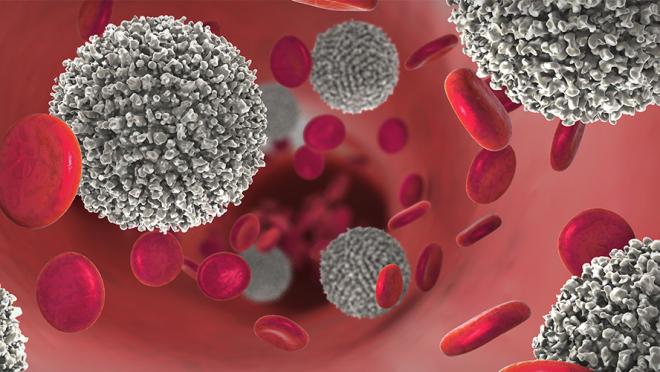
A study from Princess Margaret Cancer Centre (PM) has found a potential treatment for patients with relapsed or treatment-resistant acute myeloid leukemia (AML) and Myelodysplastic Syndromes (MDS), a group of disorders affecting bone marrow function.
AML is an aggressive cancer where immature white blood cells, called myeloblasts, multiply uncontrollably and disrupt the production of healthy blood cells. Outcomes vary based on the types of gene mutations a patient with AML carries. Although it can be cured in 35-40% of patients under the age of 60 and 5-15% of patients over 60, those with certain mutations, such as in the Tumour Protein p53 gene (TP53), have a median overall survival of 5-10 months. There is no standard treatment for patients with relapsed or treatment-resistant AML.
MDS syndrome, where the bone marrow does not produce enough healthy blood cells, can vary widely in severity, ranging from mild cases that may not require treatment to more serious forms that can progress to AML. The only curative option for these patients is stem cell transplantation.
A protein called polo-like kinase 4 (PLK4) is dysregulated in several cancers, including AML. PLK4 plays a role in regulating cell division and high levels of this protein are associated with poor survival in AML.
“An inhibitor that targets PLK4, called CFI-400945, was discovered in a prior drug discovery program at UHN. Previous research in tumour samples and drug characteristics, such as selectivity, make it a promising candidate for cancer treatment,” says Dr. Karen Yee, Clinician Investigator at PM and senior author of the study. “To examine this candidate, CFI-400945 was tested in tumour models and we conducted a phase I clinical trial in high-risk patients with relapsed and untreatable AML.”
CFI-400945 is part of Treadwell Therapeutics’ drug development pipeline. Launched in 2019 based on research at PM, Treadwell is currently developing various therapy options for cancer.
The tumour model studies indicated that CFI-400945 is effective, with a treatment response in cells with TP53 mutations, suggesting that PLK4 is a potential therapeutic target in TP53 mutant AML.
The clinical trial was then conducted with 13 individuals with relapsed and treatment-resistant AML. Gene mutation analysis was available for eight of these patients and indicated that four had mutations in TP53. Patients were treated with CFI-400945 at increasing doses from 64 mg/day to 128 mg/day.
“We found that three out of nine patients evaluated for efficacy saw complete remission. One other patient showed a greater than 50% improvement in white blood cell counts,” says Dr. Yee. “Additionally, of these four patients, three of them had TP53 mutations.”
This study underscores the promising role of CFI-400945 as a potential treatment for a typically challenging form of AML. Manageable side effects, such as enteritis/colitis (inflammation of the small or the large) were noted, indicating a reasonable safety profile. Moving forward, researchers are investigating CFI-400945's efficacy and safety in larger patient cohorts, as well as in combination with other therapies.
This work was supported by The Princess Margaret Cancer Foundation (PMCF). Dr. Karen Yee is an Associate Professor at the University of Toronto.
Dr. Karen Yee has been a consultant for Bristol Myers Squibb/Celgene, F. Hoffmann-La Roche, GSK, Jazz Pharmaceuticals, Novartis, Pfizer, Shattuck Labs, Taiho Oncology, and Takeda; Dr. Yee received research funding from Astex Pharmaceuticals, Forma Therapeutics, F. Hoffmann-La Roche, Forma Therapeutics, Genentech, Geron Corporation, Gilead Sciences, Janssen Pharmaceuticals, Jazz Pharmaceuticals, Novartis, Shattuck Labs, and Treadwell Therapeutics, and received honoraria from AbbVie, TaiHo, and Novartis. For a full list of competing interests, see article.
Murphy T, Mason JM, Leber B, Bray MR, Chan SM, Gupta V, Khalaf D, Maze D, McNamara CJ, Schimmer AD, Schuh AC, Sibai H, Trus M, Valiquette D, Martin K, Nguyen L, Li X, Mak TW, Minden MD, Yee KWL. Preclinical characterization and clinical trial of CFI-400945, a polo-like kinase 4 inhibitor, in patients with relapsed/refractory acute myeloid leukemia and higher-risk myelodysplastic neoplasms. Leukemia. 2023 Dec 19. doi: 10.1038/s41375-023-02110-9.

Image showing red blood cells (red) and abnormal white blood cells (white). AML is a blood cancer that originates from cells in the bone marrow that turn into white blood cells. These abnormal cells grow and divide too fast, build up in the bone marrow, and spill out into the blood. (Getty images).




